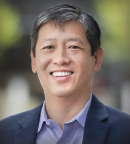NRG Oncology, the RTOG Foundation, and the University of California, San Francisco (UCSF), announced the death of Felix Feng, MD, from cancer at age 48 on December 10, 2024.
Dr. Feng was a George and Judy Marcus Distinguished Professor; Professor of Radiation Oncology, Urology and Medicine; Vice Chair for Translational Research in the UCSF Department of Radiation Oncology; Director, Benioff Initiative for Prostate Cancer Research; Associate Director for Translational Clinical Research; and Co-Leader, Prostate Cancer Program, UCSF Helen Diller Family Comprehensive Cancer Center.

Felix Feng, MD
Dr. Feng was also a member of the RTOG Foundation Board of Directors. Over the years, Dr. Feng chaired or co-chaired 13 research protocols for NRG and RTOG. He was appointed Committee Chair in March 2018.
Dr. Feng attended Stanford University for his undergraduate degree, and it was there that he met his future wife, Mary. Together, they studied medicine at Washington University in St. Louis and completed their radiation oncology residencies at the University of Michigan. They remained on faculty there until 2016, when they moved back to California for faculty positions at UCSF.
The Feng Lab
At UCSF, Dr. Feng also developed The Feng Lab, which featured the expertise of biologists and computational scientists to advance the understanding of cancer biology and ultimately improve patient outcomes. His research team produced the first clinical-grade biomarker panels that predict prostate cancer response to radiation or hormone therapy after surgery, as well as a plasma-based cell-free DNA biomarker that predicts resistance to PARP1 inhibitors.
Additionally, Dr. Feng’s laboratory has helped identify the mechanisms by which genes such as PARP1, DNAPK, SChLAP1, and PCAT1 contribute to prostate cancer progression. Researchers in Dr. Feng’s laboratory also performed key preclinical therapeutic studies that have contributed to the initiation of clinical trials investigating PARP1 inhibitors, DNAPK inhibitors, and bromodomain inhibitors in patients with metastatic prostate cancer.
Mentors and Inspiration
In an interview with The ASCO Post in 2020, Dr. Feng shared these comments: “The key to academic success rests largely on having a strong relationship with mentors. I’ve been blessed with a number of phenomenal mentors during my formative years in medicine. My primary mentor was Dr. Ted Lawrence, who was Chair of the Department of Radiation Oncology at the University of Michigan. I actually did my postdoctoral fellowship between my radiology residency and radiation oncology residency in Ted’s lab. I was co-mentored by Dr. Arul Chinnaiyan, a brilliant scientist at the University of Michigan, who investigates genomics approaches to understanding cancer biology and discovering new biomarkers.”
Dr. Feng also credited mentors in his clinical development: “Dr. Howard Sandler was a radiation oncologist at the University of Michigan until he became Chair of the Radiation Oncology Program at Cedars-Sinai Medical Center in Los Angeles,” Dr. Feng said. “Howard inspired me to focus on prostate cancer, which has become my main clinical interest. Another major mentor was Dr. Lori Pierce, a breast cancer radiation oncologist who is a past ASCO President. She was at the University of Michigan during my early career and was very supportive of my work then in breast cancer.”
Esteemed Leader, Husband, and Father
Among many tributes from colleagues and friends, Quynh Thu-Le, MD, NRG Oncology Group Chair, RTOG Foundation Group Chair, shared these thoughts: “Felix was a towering figure in the realm of prostate cancer research and served as the esteemed leader of the GU Committee for NRG Oncology for many years. His extraordinary vision, unwavering leadership, and remarkable mentorship propelled numerous successes for our organization. With Felix’s passing, the fields of radiation oncology and cancer research have lost a brilliant scientist and an exceptional leader, while many of us have lost a wonderful friend and colleague. However, Felix’s legacy will endure—not only through the impactful trials and scientific advancements he championed but also through the countless patients he tended and the many researchers he inspired along the way.”
Dr. Feng is survived by his wife, Mary and his two children, Eric (18), and Emily (15), along with other family and countless colleagues and friends.
To read more about Dr. Feng, visit https://ascopost.com/issues/january-25-2020/felix-feng-strives-for-balance-between-work-and-family-life/.
Adapted from several sources: https://www.nrgoncology.org/Home/News/Post/legacy-tribute-in-honor-of-felix-feng-md; https://medschool.ucsf.edu/news/memoriam-felix-feng-md; https://www.legacy.com/us/obituaries/sfgate/name/felix-feng-obituary?id=57002386; https://ascopost.com/issues/january-25-2020/felix-feng-strives-for-balance-between-work-and-family-life/.

